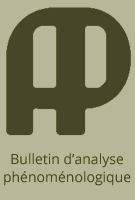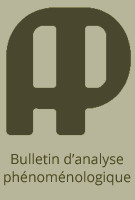- Portada
- Volume 4 (2008)
- Numéro 1
- Les deux faces du logos chez Husserl : Du couple expression/signification au couple signification/syntaxe
Vista(s): 1165 (5 ULiège)
Descargar(s): 1021 (7 ULiège)
Les deux faces du logos chez Husserl : Du couple expression/signification au couple signification/syntaxe

Résumé
À partir de la définition de la phénoménologie dans les Recherches logiques, Husserl revient systématiquement sur la définition des structures fondamentales de sa pensée dans ses cours à l’Université de Göttingen. Parmi ces cours, celui de logique de l’année 1902-1903 (Logik Vorlesung 1902/03) revêt une importance essentielle pour la définition de l’orientation de la phénoménologie vers le tournant « transcendantal ». En commentant les textes de trois paragraphes fondamentaux de ce cours, ceux qui traitent du lien entre la théorie de la signification et la théorie de la modification, on a essayé de voir comment et selon quelles lignes thématiques directrices la théorie des actes de modification donne à la phénoménologie une première orientation transcendantale. Le couple conceptuel « expression/signification », dont la définition est tirée explicitement de la première Recherche, représente le terminus a quo d’un travail conceptuel qui mènera à la définition du couple « signification/syntaxe ». Ce dernier, relevant directement de la théorie des actes de modification, ne se laisse pas enfermer dans l’horizon thématique de la quatrième Recherche logique mais se révèle, par sa richesse et sa complexité thématique, déjà orienté vers un autre stade de la recherche phénoménologique, qui anticipe (et esquisse) le tournant transcendantal.
Abstract
Husserl’s definition of phenomenology in the Logical Investigations was systematically re-examined in his lessons at the University of Göttingen. The logic course of the year 1902-1903 (Logik Vorlesung 1902/03) is very important to understand the “transcendental turn” of Husserl’s phenomenology. By explaining three essential paragraphs of this course, which deal with the relationship between the theory of meaning and the theory of modification, the author here tries to see how the theory of modification acts gives phenomenology a first transcendental orientation. The conceptual couple of expression and meaning, whose definition is explicitly taken from the first Logical Investigation, represents the terminus a quo of a conceptual working that will later lead Husserl to the couple of meaning and syntax. The second couple, which is a matter for the theory of modification acts, cannot be confined in the thematic horizon of the fourth Investigation, but by its richness and thematic complexity it already appears to be connected to another phase of phenomenological research, which anticipates (and also provides a first sketch of) the transcendental turn.
Para citar este artículo
Acerca de: Fausto Fraisopi
Archives Husserl de Paris, UMR 8547






